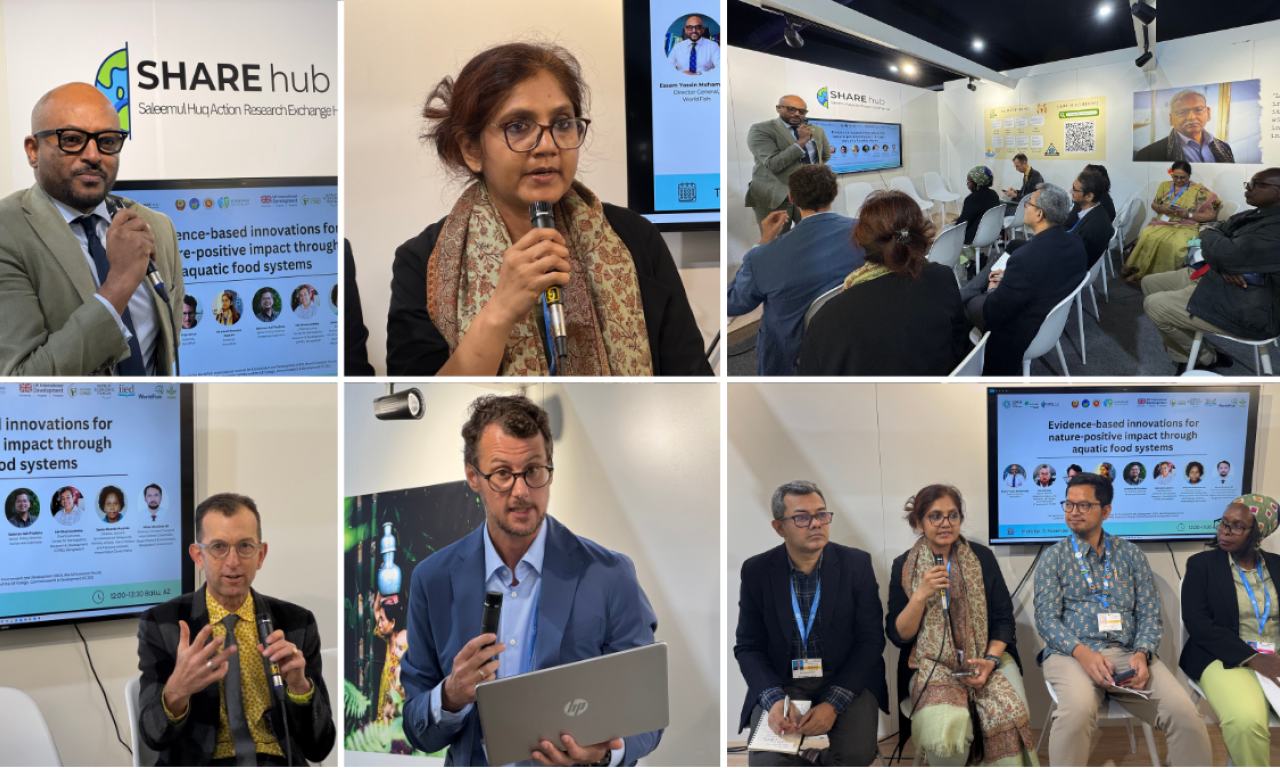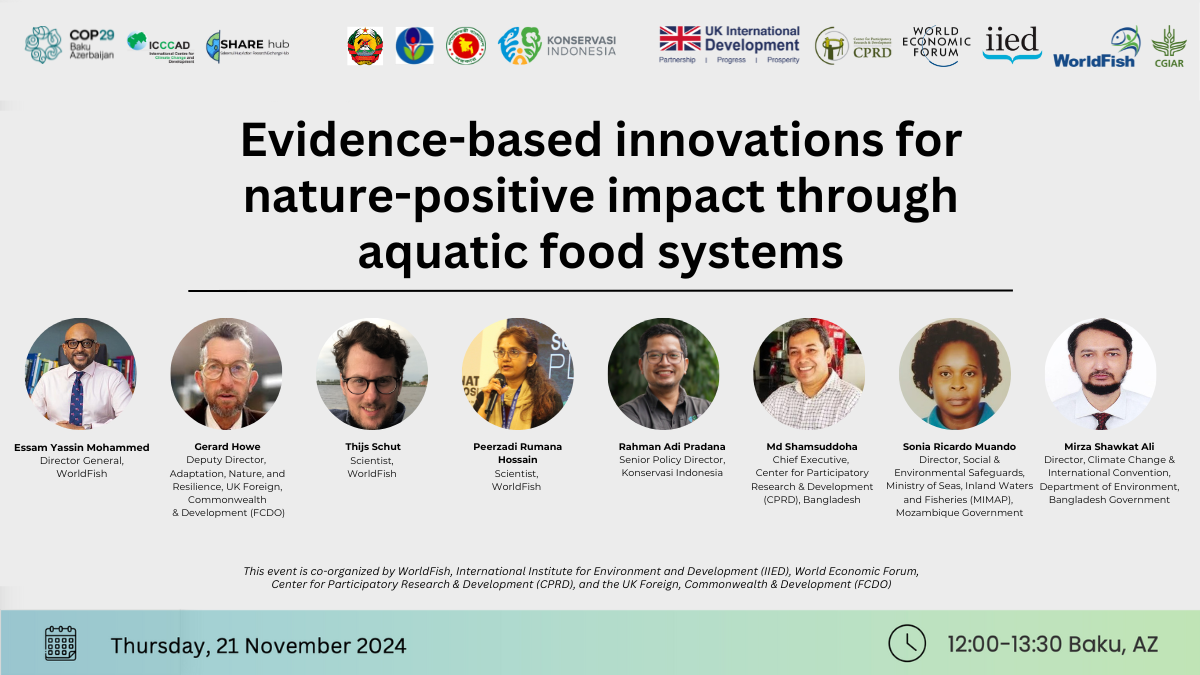
Billions of people worldwide rely on aquatic food systems such as fisheries and aquaculture for their livelihoods and for high-quality, affordable, low-carbon nutrition. However, these systems are increasingly threatened by a changing climate.
At COP29, scientists and researchers from WorldFish’s Asia-Africa BlueTech Superhighway (AABS) and its partners emphasized the need for increased funding to support locally led, evidence-based solutions that improve the sustainability and climate resilience of aquatic food systems.

In the COP29 SHARE Hub, which was created in honor of the late Dr Saleemul Huq, AABS organized a side event on ‘Evidence-based innovations for nature-positive impact through aquatic food systems. This panel discussion highlighted the need to protect employment, income and food security in fishing communities from the impacts of climate change.
Gerard Howe, Department Director, Adaptation, Nature and Resilience (ANR) in the Energy, Climate and Environment Directorate of the UK Foreign, Commonwealth & Development Office (FCDO), delivered a keynote address on the importance of coastal and marine resources management for food and livelihood security. AABS is a component project of Climate and Ocean Adaptation and Sustainable Transition (COAST), which is funded by the Blue Planet Fund, the UK’s £500 million program supporting developing countries to protect the marine environment and reduce poverty.
This was followed by a panel discussion featuring: Rahman Adi Pradana, Senior Policy Director at Konservasi Indonesia; Peerzadi Rumana Hossain, Scientist Climate Change and Aquatic Food Systems, WorldFish; Md Shamsuddoha, Chief Executive, Center for Participatory Research and Development, Bangladesh; and Sonia Ricardo Muando, Director for Social and Environmental Safeguards, Ministry of Seas, Inland Waters and Fisheries (MIMAP), Mozambique.
The event highlighted examples of climate-resilient and nature-positive solutions for aquatic food systems in Africa, Asia, and the Pacific, building on experiences from AABS.
Climate Change Adaptation
In the panel, Hossain explored the wide-ranging climate challenges for aquatic food systems. For example, Bangladesh is a low-lying country that is highly vulnerable to sea level rises, saltwater intrusion and the gradual onset of salinization in the land, as well as the consequences of more frequent cyclones and tidal surges. These incidents affect coastal communities, which are made up of small-scale fishers and fish farmers. At the same time, the country is affected by large scale interannual climate variabilities because of its northern Himalayan region and monsoon-dominated climate. This means that extreme heat, cold spell, heavy/erratic rain, monsoon and riverine floods are all affecting aquatic food systems across the country. The extreme weather events of 2024 in Bangladesh caused one third of ponds to flood, resulting in fish and broodstock loss, infrastructural damage, and loss of USD $122 million.
Climatic shocks, poor infrastructure and socio-economic factors prevent small-scale aquatic food producers from tackling climate risks. WorldFish works with vulnerable communities, particularly small-scale fishers, on a range of climate adaptation measures that build climate resilience with a nature-positive impact. Community-based, enhanced coastal fisheries co-management interventions, year-round culture systems in high saline salt fields, livelihood diversification through Integrated Multitrophic Aquaculture (IMTA), and climate information services are all helping to tackle climate-induced challenges in coastal communities.
WorldFish also works with the Bangladeshi government to formulate climate responsive policy propositions and financial inclusion, building awareness of successful interventions so they can be enhanced at scale.
Ecosystem Preservation
Pradana explained how aquaculture production is a significant contributor to aquatic food systems in Indonesia, while also being the biggest contributor to mangrove degradation; key policy gaps allow for this to happen.
Pradana suggested that climate-smart shrimp could tackle mangrove degradation, a solution which is piloted through AQUADAPT/Aquaculture adaptation to climate change. This project demonstrates a novel model for increasing shrimp production and restoring mangroves, offering a nature-based solution that simultaneously intensifies production and revives the ecosystem. To continue this success, fisheries food systems need to be integrated into strategic planning.
Borderless Solutions
Shamsuddoha highlighted the dissonance between coastal communities and climate change policies and investment in Bangladesh. These groups play a key role in climate resilience through their community-based adaptation strategies, despite their vulnerability. However, current policies and investment focus on large-scale infrastructure instead.
He also flagged that climate change impacts are often addressed within national borders or framed within local contexts, even though many climate-induced challenges – floods, cyclones, extreme rainfall, and others – are not confined by borders. Global drivers further complicate these impacts, affecting all countries in interconnected ways. Shamsuddoha recommended that climate adaptation plans go beyond state boundaries to address common vulnerabilities.
Targeted Policy Interventions
Muando explored the need for a strategic action plan at national level to achieve increased investment and implement local interventions. In Mozambique, aquatic food systems such as coastal fisheries and aquaculture are vital for food security, income generation, and sustainable economic growth for coastal communities. However, MIMAP highlights that marine catches have reached the stage of full exploitation, with some fisheries already showing signs of decline.
In 2019, the Mozambican government began promoting aquaculture as a strategic complement to fishing because it increases demand while reducing pressure on fishery resources and ecosystems. However, slow growth in aquaculture production has challenged the sector from reaching its full potential. This led to the government adopting the Aquaculture Development Strategy 2020-2030, which aims to ensure sustainable use of resources for food security, job creation, and trade balance improvement while protecting the environment. This is in addition to other policies and strategies that will strengthen resilience, mitigate climate change impacts, and protect biodiversity.
Muando explained that Mozambique prioritizes investment in strengthening the sustainable management of mangrove ecosystems, technical training on resilient aquaculture and marine practices for communities, and developing robust policies that encourage the blue economy and circular economy. At the same time, the country promotes scientific research and monitors and implements innovative technologies. Combining these efforts will consolidate a sustainable future aligned with national and international development and conservation commitments.
With diverse expertise on the panel, covering research, practice, and investment, the event explored how to increase funding for these nature-based climate solutions and focus on investments in locally led and evidence-based approaches. They also highlighted how to mainstream these initiatives into national and international climate strategies, while strengthening the voices of young people and vulnerable communities in climate decision-making.
The AABS session was brought to a close by Mirza Shawkat Ali, Director, Climate Change & International Convention, Department of Environment, Ministry of Environment, Forest and Climate Change, Bangladesh. In his speech, he emphasized the need to fully include aquatic food systems in nationally determined contributions (NDCs). To do so, countries can draw on new guidelines released by WorldFish and partners.